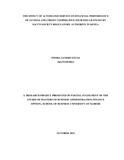| dc.description.abstract | Saccos in Kenya have developed rapidly in terms of size, structure and variety of product
and services. They have transformed gradually from manual system of operations based on
traditional savings and loaning activities to a more open effective and competitive system
which is able to offer an extensive range of products and services. The growth in products,
services and membership has led many Saccos automating their services and therefore
improved productivity. The objective of the study was to determine effect of automated
service on financial performance of Saccos licensed by SASRA in Kenya. This research
took a descriptive- survey design type which is designed to describe the characteristics or
behaviors of a particular population and in a systematic and accurate fashion.
The population under study was made up of 130 Saccos. A sample of 45 licensed Saccos
based in Nairobi and Kiambu Counties were selected for this study. The sampling method
chosen for this study was convenient sampling which is a form of non-probability
sampling. Secondary data was used to collect data on the dependent variable, financial
performance. This was done by calculating return on assets. Primary data was used to
collect data on independent variables where open and closed ended questionnaires were
administered to target population. Significance of automated service quality variables as
predictors of financial performance was tested using the F-test. Analysis of Variance
(ANOVA) was used. The Statistical Package for Social Sciences (SPSS) version 20 was
used to analyze the data collected. The coefficient of determination, R squared, measure
was used to test the significance of the regression model in explaining the relationship
between automated service quality and financial performance.
The study found out that all the Saccos (100%) had undertaken automation of BOSA and
FOSA operations in the last 5 years. The study also found out that majority of the Saccos
introduced internet banking services, mobile banking and ATM services. These reduced
the dependence on the branch network as a core delivery mechanism. From the regression
model, the study deduced that taking into consideration all the five factors (expenditure in
internet banking, expenditure in automation, expenditure in mobile banking, number of
ATM cards issued and size of the Sacco) there is a positive effect on financial performance
of Saccos licensed by SASRA. The study concludes that generally automated services have
a positive influence on the financial performance of Saccos in Kenya. The study
recommends that automation of financial services should be used as a complement to,
rather than a substitute for physical branches due to the level of technology literacy in the
rural areas. | en_US |

